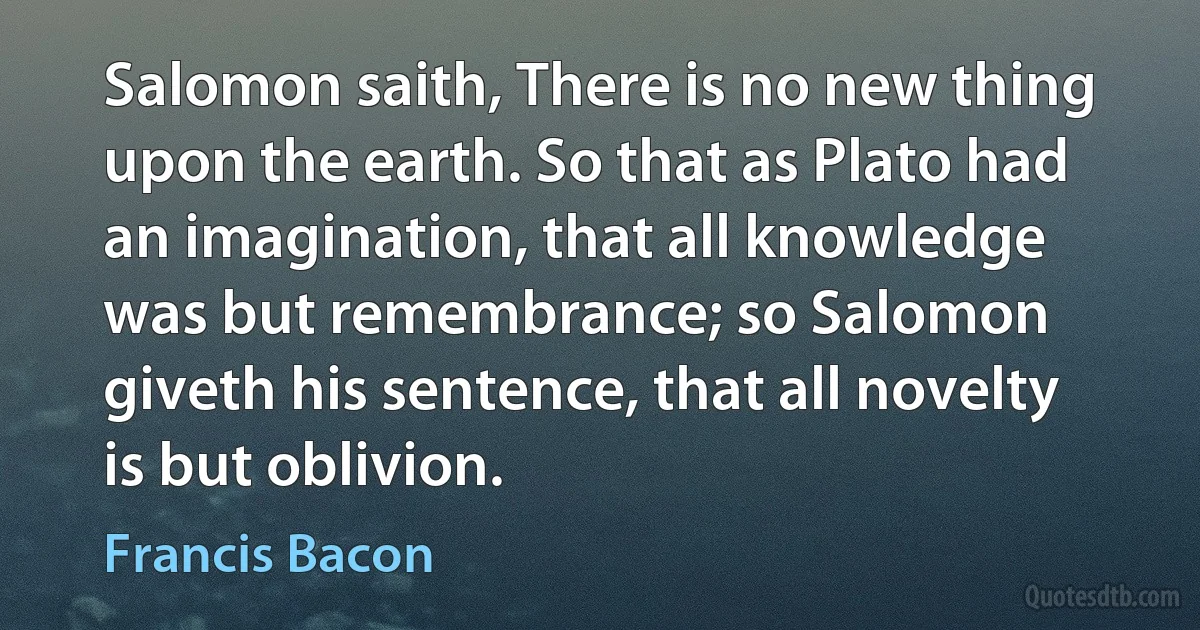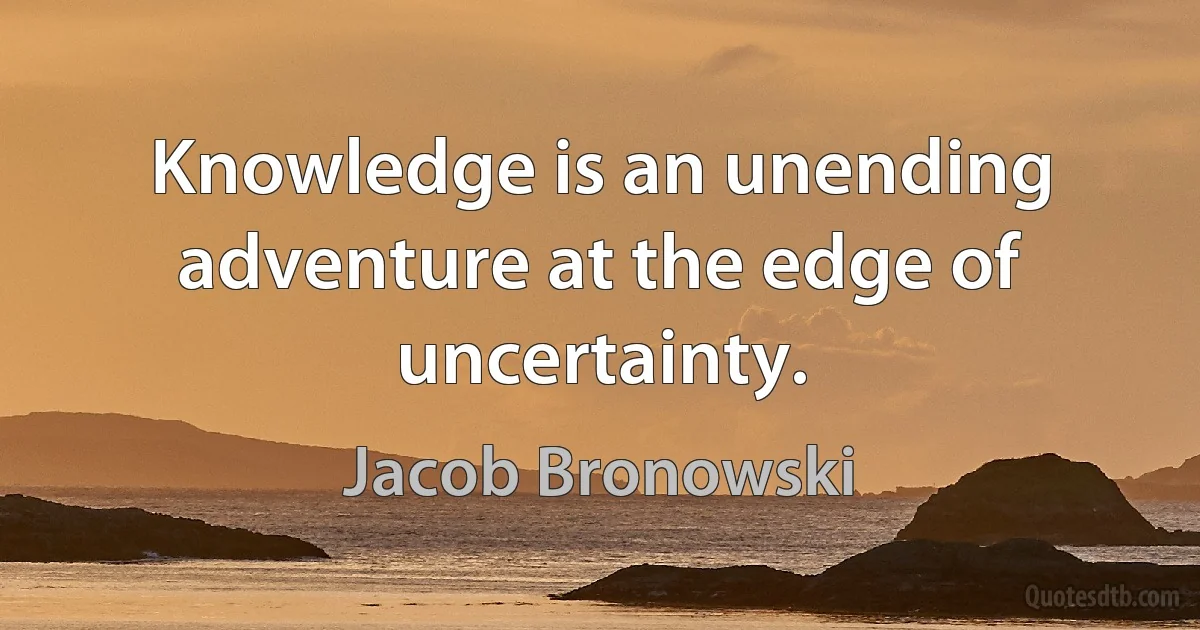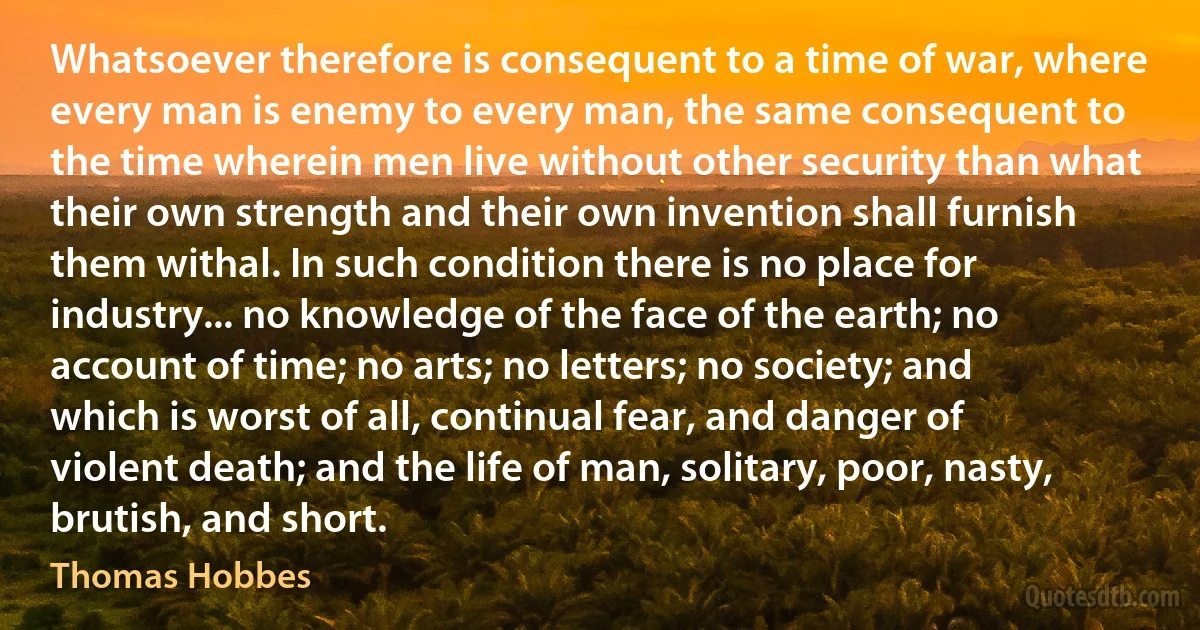Knowledge Quotes - page 94
The greatest error of all the rest is the mistaking or misplacing of the last or farthest end of knowledge: for men have entered into a desire of learning and knowledge, sometimes upon a natural curiosity and inquisitive appetite; sometimes to entertain their minds with variety and delight; sometimes for ornament and reputation; and sometimes to enable them to victory of wit and contradiction; and most times for lucre and profession; and seldom sincerely to give a true account of their gift of reason, to the benefit and use of men.

Francis Bacon
It is not the pleasure of curiosity, nor the quiet of resolution, nor the raising of the spirit, nor victory of wit, nor faculty of speech ... that are the true ends of knowledge ... but it is a restitution and reinvesting, in great part, of man to the sovereignty and power, for whensoever he shall be able to call the creatures by their true names, he shall again command them.

Francis Bacon
To God, truly, the Giver and Architect of Forms, and it may be to the angels and higher intelligences, it belongs to have an affirmative knowledge of forms immediately, and from the first contemplation. But this assuredly is more than man can do, to whom it is granted only to proceed at first by negatives, and at last to end in affirmatives, after exclusion has been exhausted.

Francis Bacon
Only charity admitteth no excess. For so we see, aspiring to be like God in power, the angels transgressed and fell; Ascendam, et ero similis altissimo: by aspiring to be like God in knowledge, man transgressed and fell; Eritis sicut Dii, scientes bonum et malum: but by aspiring to a similitude of God in goodness or love, neither man nor angel ever transgressed, or shall transgress.

Francis Bacon
For I find that even those that have sought knowledge for itself and not for benefit, or ostentation, or any practical enablement in the course of their life, have nevertheless propounded to themselves a wrong mark, namely, satisfaction, which men call truth, and not operation. For as in the courts and services of princes and states, it is a much easier matter to give satisfaction than to do the business; so in the inquiring of causes and reasons it is much easier to find out such causes as will satisfy the mind of man, and quiet objections, than such causes as will direct him and give him light to new experiences and inventions.

Francis Bacon
One aim of the physical sciences has been to give an exact picture of the material world. One achievement of physics in the twentieth century has been to prove that that aim is unattainable. There is no absolute knowledge and those who claim it, whether they are scientist or dogmatist, open the door to tragedy. All knowledge, all information is imperfect. We have to treat it with humility.

Jacob Bronowski
If all are born and live for the express purpose of learning to know God, and if the knowledge of God, in so far as it fails to produce this effect, is fleeting and vain, it is clear that all those who do not direct the whole thoughts and actions of their lives to this end fail to fulfil the law of their being.

John Calvin
Since the word "knowledge" occurs in my general title... I am going to be talking about epistemology, although I prefer to use the eighteenth-century, indeed, medieval phrase, "natural philosophy."... that enterprise of the human mind which attempts to trace lawfulness to nature, dead and living, but which is not directed to specific inquiries into how this or that law works. Philosophy in the sense in which I practice it, natural philosophy, is concerned with lawfulness rather than with laws and the general nature of laws rather than with the specific structure of this or that law. Natural philosophy was one of the three topics (moral philosophy and metaphysical philosophy were the others) to which one graduated in medieval universities after having studied the seven liberal arts.
I believe that we need to review the whole of our natural philosophy in the light of scientific knowledge that has arisen in the last fifty years.

Jacob Bronowski
Our feeling of ignorance, vanity, want, weakness, in short, depravity and corruption, reminds us ... that in the Lord, and none but He, dwell the true light of wisdom, solid virtue, exuberant goodness. We are accordingly urged by our own evil things to consider the good things of God; and, indeed, we cannot aspire to Him in earnest until we have begun to be displeased with ourselves. For what man is not disposed to rest in himself? Who, in fact, does not thus rest, so long as he is unknown to himself; that is, so long as he is contented with his own endowments, and unconscious or unmindful of his misery? Every person, therefore, on coming to the knowledge of himself, is not only urged to seek God, but is also led as by the hand to find him.

John Calvin
Whatsoever therefore is consequent to a time of Warre, where every man is Enemy to every man; the same is consequent to the time, wherein men live without other security, than what their own strength, and their own invention shall furnish them withall. In such condition, there is no place for Industry; because the fruit thereof is uncertain: and consequently no Culture of the Earth; no Navigation, nor use of the commodities that may be imported by Sea; no commodious Building; no Instruments of moving, and removing things as require much force; no Knowledge of the face of the Earth; no account of Time; no Arts; no Letters; no Society; and which is worst of all, continuall feare, and danger of violent death; And the life of man solitary, poore, nasty, brutish, and short.

Thomas Hobbes
Man knows and his capacity to know depends on his biological integrity; furthermore, he knows that he knows. As a basic psychological and, hence, biological function cognition guides his handling of the universe and knowledge gives certainty to his acts; objective knowledge seems possible and through objective knowledge the universe appears systematic and predictable.

Humberto Maturana



